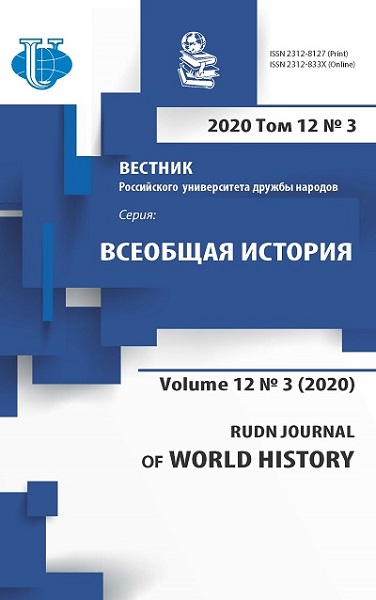Том 12, № 3 (2020)
- Год: 2020
- Статей: 9
- URL: https://journals.rudn.ru/world-history/issue/view/1370
- DOI: https://doi.org/10.22363/2312-8127-2020-12-3
Весь выпуск
Идеи и политика в истории
Концентрационные лагеря нацистской Германии как феномен: возможности и проблема понимания
Аннотация
В данной статье речь идет о нацистских концентрационных лагерях как феномене социальной жизни и общественной мысли Европы середины - второй половины ХХ столетия. Сегодня, когда мир переживает кризис политических и общественных институтов, остается все меньше надежд, что это осознание произойдет. Говорится о предпосылках формирования системы концентрационных лагерей нацистской Германии, о формах их функционирования, приводятся сравнительные данные о статистике количества лагерей. Также указывается на важность понимания процессов психологического уничтожения человека в лагере.
 211-221
211-221


Место образования в концепции «Нового общества» авторитарного режима Фердинанда Маркоса на Филиппинах (1972-1982 гг.)
Аннотация
 222-235
222-235


Из истории Востока
Особенности политико-религиозного развития ойратов в середине XIV - середине XV вв
Аннотация
Период, начиная со второй половины XIV в. и до середины XV в. прошедший под знаком падения в Китае монгольской династии Юань, является важнейшим в истории восточных монголов и ойратов. До тех пор правило, согласно которому власть получали лишь представители «Золотого рода» (т. е. потомки Чингисхана по мужской линии), фактически не подвергалось никакому сомнению, однако со временем стали появляться различные его трактовки. Например, ойраты, как не-чингисиды, должны были утверждать свою власть, владея лишь вторыми ролями (первый министр - тайши). Ойраты, несмотря на внутренние неурядицы и борьбу с потомками юаньских правителей, смогли претендовать на образование единого монгольского государства, будучи под правлением тайшей из рода чорос. После длительной борьбы с восточными монголами (которых иногда возглавляли тоже ойраты, например Угэчи Хашиг и его сын Эсеху) таких ойратских лидеров, как Батула, Батуболо, Тайпин и Тогон, сыну последнего Эсэну удалось в краткие сроки не только вновь объединить ойратов, но и создать единое монгольское государство. Кроме того, он возродил религиозную и политическую роль сангхи, скорее всего, учения Карма Кагью черношапочная. Это было особенно важно, поскольку, кроме идеологического противовеса праву чингисидов, следовало отреагировать на рост активности ислама в регионе.
 236-249
236-249


Аббасидские и саманидские военные институты как исторический контекст для Газнавидов
Аннотация
Газнавидское государство - первая династия тюркского происхождения в истории Ирана, которое характеризовалось военными успехами и ожесточенной политической борьбой между правителями и войском. Выявление причины такого противоречия обусловливается анализом исторического контекста правления тюрков. Поскольку одной из важнейших причин падения Аббасидов и Саманидов было вмешательство невольников-тюрков в политику, в статье военные институты двух династий исследуются параллельно. Изучение источников и литературы, относящейся к этому периоду, показывает, что структура формирования вооруженных сил при двух династиях не только послужили прообразом для Газнавидов, но и создали условия, приведшие гулямов-тюрков к власти. Правители двух династий изначально были вынуждены набирать их в армию в качестве опоры и поддержания власти, однако уступили им свое владычество по мере усиления влияния тюркских военнослужащих. В связи с этим Газнавиды, сохраняя первостепенное положение тюрков в войсках, проявляли осторожность в отношении воинов-тюрков и полководцев.
 250-260
250-260


Современный мир
Политические и экономические отношения Эфиопии и Китая на современном этапе
Аннотация
 261-273
261-273


Политика Турции в отношении этнических меньшинств
Аннотация
 274-285
274-285


Становление ведущих ВУЗов США и Ассоциации внешней политики как элементов публичной дипломатии США
Аннотация
В данной статье автор рассматривает период становления ведущих высших учебных заведений США и Ассоциации внешней политики в качестве элементов экономического, политического и культурного влияния на всемирные политические процессы. Автор данной работы методично и последовательно приводит аналитические, исторические факты, доказывающие косвенное и непосредственное воздействие на внешнюю политику стран. Актуальность статьи обусловлена высокой значимостью и влиянием негосударственных акторов на мировую политику. По мнению автора, политический курс руководства Соединенных Штатов в первой четверти XX века, ориентированный на более активное включение страны в международную политику и отказ от изоляционизма, что в первую очередь выражалось в отходе от постулатов доктрины Монро и вступлении США в Первую мировую войну, оказали большое влияние на развитие публичной дипломатии США как инструмента, способствующего продвижению интересов страны. Все это потребовало активное вовлечение высших учебных заведений в процесс публичной дипломатии, а также создание новых негосудартсвенных институтов.
 286-291
286-291


Из истории Латинской Америки
Организационная структура Движения за национальное освобождение Тупамарос в Уругвае (1965-1972 гг.)
Аннотация
Данная работа представляет собой первую в отечественной историографии попытку детально рассмотреть структуру революционной организации Движение за национальное освобождение - Тупамарос, действующего в Уругвае в 1960-х - начале 1970-х гг. В связи с тем, что Движение носило подпольный характер, данные о его структуре, численности, участниках восстанавливаются как по официальным документам организации, так и по воспоминаниям рядовых участников и лидеров движения, среди которых много видных деятелей современной истории Уругвая - экс-президент Хосе Мухика, вице-президент Лусия Тополански, бывший министр обороны Э. Фернандес Уидобро и ряд других важных общественных персон. В результате данного исследования автору удалось представить структуру Движения Тупамарос и показать, как в ней реализовывалось взаимодействие двух противоречивых принципов - демократического централизма и внутренней автономии составных частей организации.
 292-301
292-301


Рецензии
Будущее без сценария. Размышления над публикацией С. Иванова «Как коронавирус изменит Россию и мир? Сценарии будущего»
 302-305
302-305
















